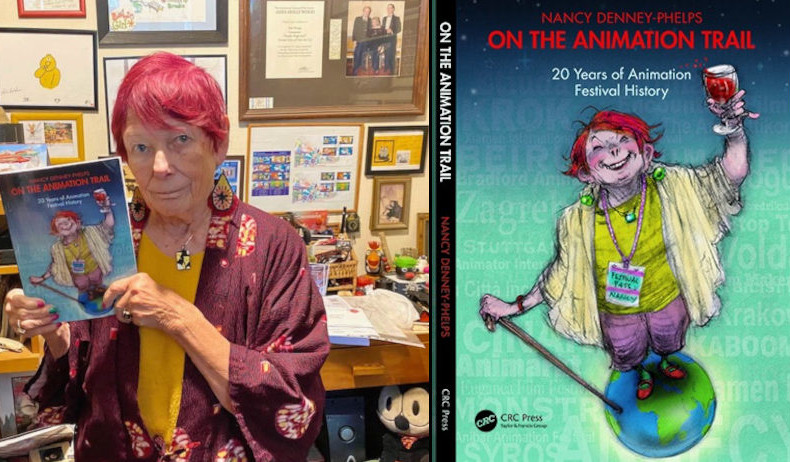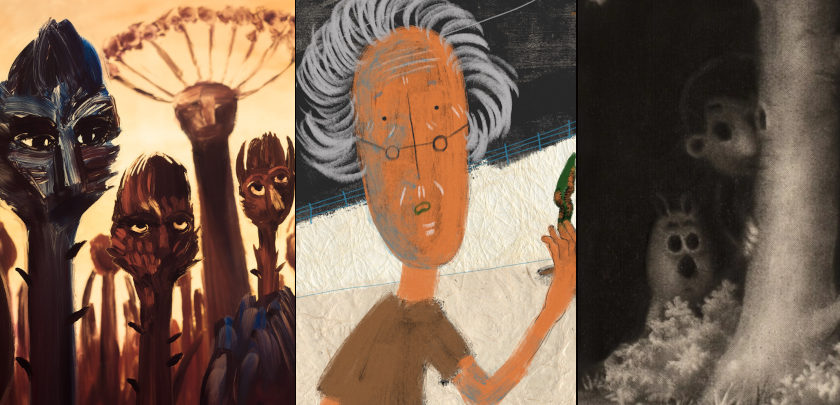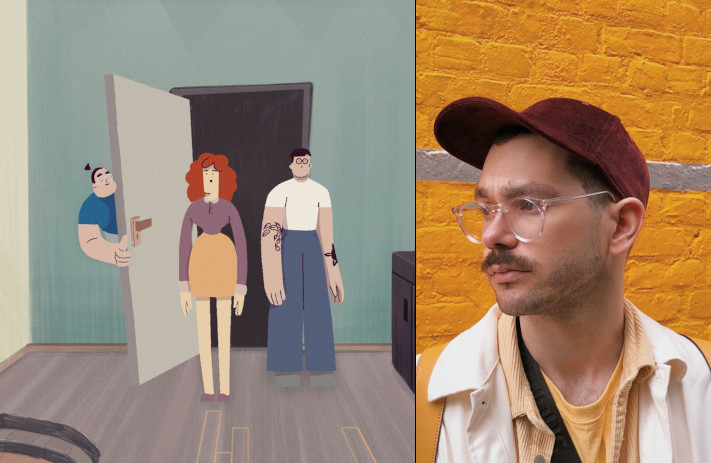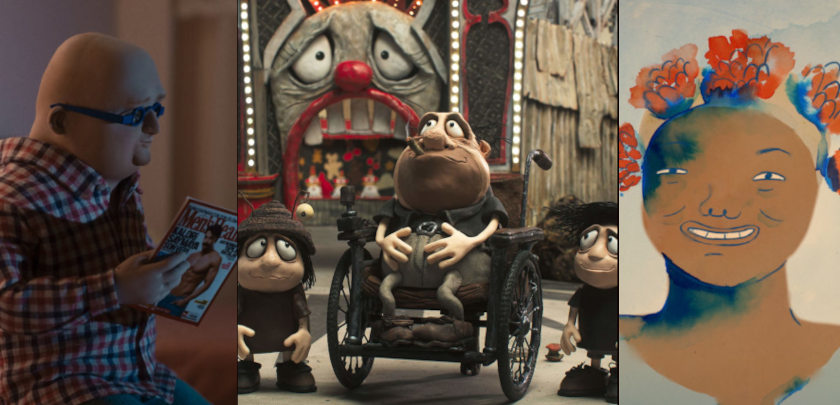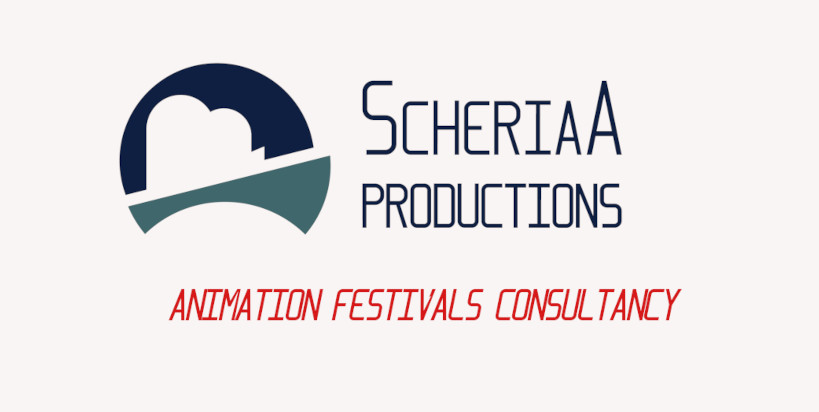Cinanima Festival 2023: Our Top Animation Picks
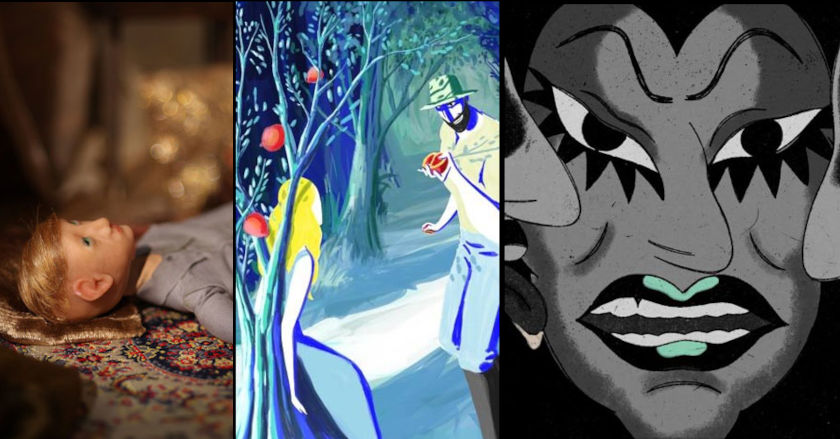
This year’s edition of the Cinanima Festival (13-19 November 2023, Espinho, Portugal) had universality as its theme. The Espinho Multimeios Space room was decorated with the flags of the countries participating in the films. There were 98 works in the international competition from 33 different countries, with France (13), the United Kingdom (8), and Israel (7) being the countries with the most significant number of films selected in feature and short film sessions.
In addition, there were other special sessions, such as the Short Programs from two important European art schools: KASK, in Ghent, Belgium, and HKU, in Utrecht, in the Netherlands. And two important exhibitions: the 100th anniversary of Portuguese Animation and the 30th anniversary of the release of Abi Feijó’s short film 'Os Salteadores' / 'The Outlaws' (1993). An animation made in cartoon form talks about a part common to the stories of the dictatorships of Franco in Spain and Salazar in Portugal. As always, it is great to see the original animation designs, even more so because this kind of exhibition is a unique opportunity for those born with a computer at home.
Cinanima was fundamental for Abi Feijó to become an animator: “It was at Cinanima that I discovered animated cinema.” On the other hand, he has a fundamental role in developing Portuguese animation, as animators such as Regina Pessoa, José Miguel Ribeiro, and Pedro Serrazina began work with him in animation. Thus, it was at the same time a recognition and a tribute to Abi Feijó’s work as a whole, highlighting the festival’s history, which will complete its 50th edition in three years.
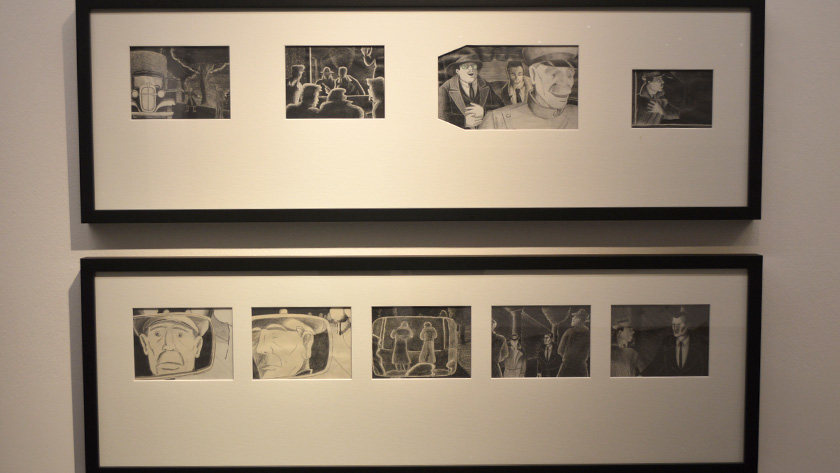
Abi Feijó 'The Outlaws' exhibition
The festival also offered opportunities to discuss animation at the level of training for schools, academic discussion, and production, with the presentation of Portuguese projects, talks, and workshops.
In summary, the diversity was immense. This time, I managed to see all the short and feature film competitions, and I bring here an overview of what impressed me most, even if it did not win an award. Those are “my 12 shorts” from Cinanima listed in chronological order of screening.
'Teacups' - Alec Green, Finbar Watson (Australia)
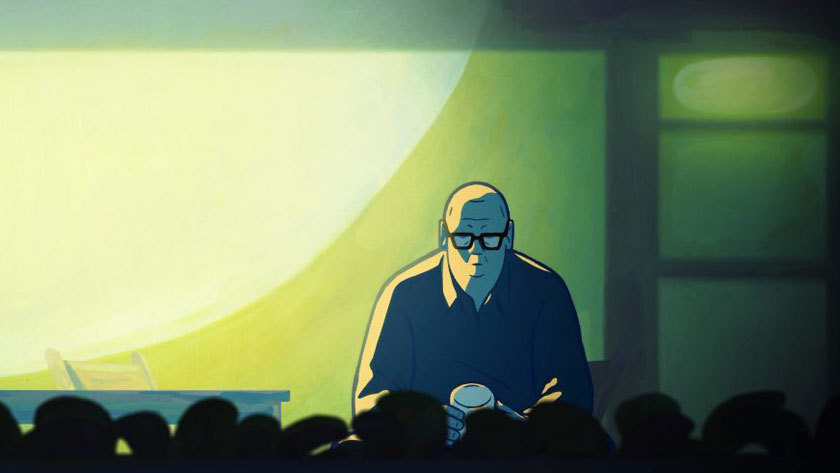
For almost half a century, Don Ritchie would approach people contemplating suicide at the edge of a cliff, just 100 feet from his home, his palms facing up. Voiced by Hugo Weaving, Teacups explores Don’s surreal interactions with years of suicidal individuals and his journey to reconcile the suicide of his best friend. The film asks, can a simple act of kindness save a life?
It is an animated documentary, that talks about an actual event. Made in cartoon form, with colors in shades of green and greyish blue, it represents well a sensitive situation as losing the will to live. Furthermore, it clarifies that this is not precisely what happens to people, but instead, the feeling of not being welcomed makes life unbearable.
'Pina' - Jeremy Depuydt, Giuseppe Accardo (Belgium)
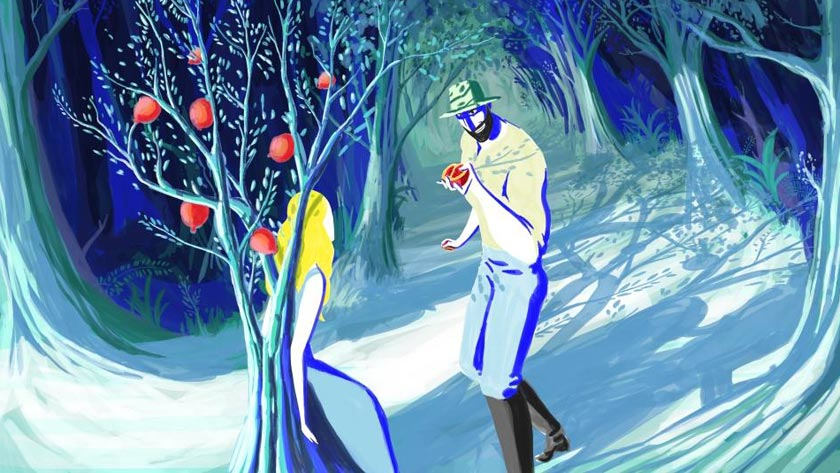
At the end of the 19th century, in a Sicilian countryside village, the young Pina holds the power to regenerate the land. With each harvest, the village is prey to shameless mafia looting. Pina's encounter with the mafia chief will plunge the hamlet into an era of starvation, endangering the destiny of the whole country.
Made in cartoon form, the short mixes myths of the feminine with the Earth and the brutality and egocentrism of the masculine that destroys the fertility of Nature. Despite being a story based on the Italian mafia (a statement made by the filmmakers), I also interpret it as the relationship between the human being, the animus, the man, active and destructive, with the anima, the woman, passive and creative. When well balanced, this relationship makes everything work well, but when not, it generates destruction and violence. Both on a private (domestic violence) and collective (the destruction of Nature) level.
'Family Portrait' - Lea Vidakovic (Croatia)
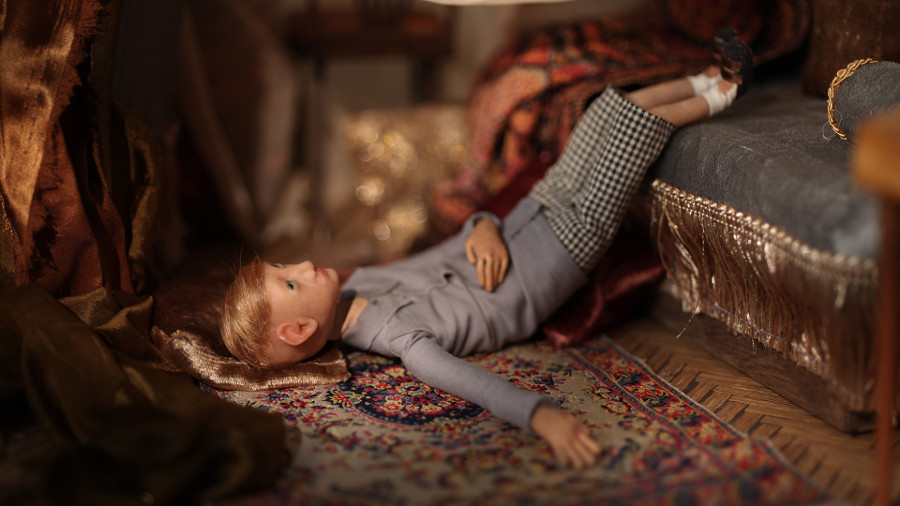
As Austro-Hungary teeters on collapse, Andras and his daughter are taken aback by the visit from Andras' brother, Zoltan, who comes accompanied by his large family.
This stop-motion short results from doctoral research and an exhibition by the animator. Rich in the details of sceneries, it was interesting how, when demonstrating everyday situations in a large family home (dropping things on the floor or leaks in a room), Lea created an ambiance of secrets, unsaid things, and loneliness. The film received the Jury's Special Prize.
| Related: 'Family Portrait' by Lea Vidakovic |
'Tomato Kitchen' - Junyi Xiao (China)
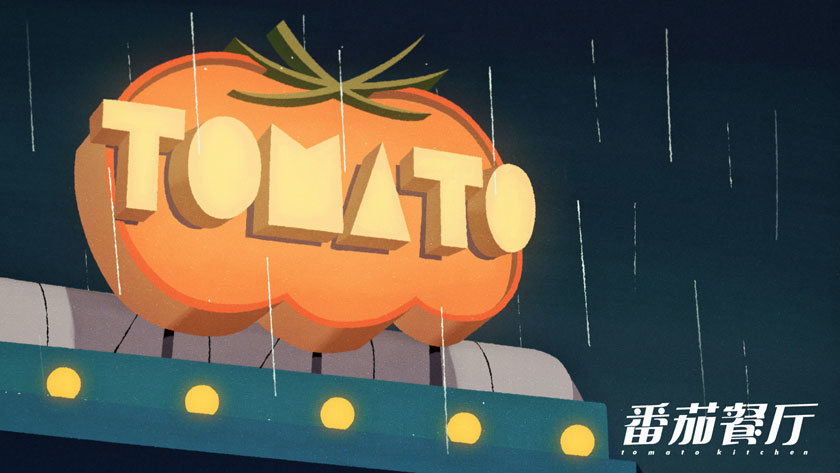
An accident interrupted Lee's dinner with his colleagues. The dark truth of the Tomato Kitchen along with Lee's hidden past were revealed by this unexpected incident.
This short film was awarded at the International Animation Festival Chilemonos in Santiago, Chile. 'Tomato Kitchen' talks about labor relations through a chain of Tomato companies. Through the cartoon in contrasting colors, it manages to demonstrate how violent and silent the suffering of thousands of workers around the globe is that they are forced to annul themselves, being enslaved people under the third millennium, and get to survive.
'Feather' - Sadegh Javadi (Iran)

A poor father lives with his son. They bet on their cock. Their income is getting worse every day till an unusual old man enters their life. Everything changes, not as they expected.
Another strong animation: Feather uses a metaphorical mise en scene but an actual narrative. We show the relationship between father and son and how poverty and the lack of a way out can corrupt human nature and its empathy. Only childish purity can bring any salvation. The drawings are expressive, and the characters' eyes say it all.
Lost at Sea - Andrés Alejandro Bartos Amory, Lucija Stojevic (Spain)
Lost at Sea is based on the real-life account of a Rohingya man that was forced to flee by sea with dozens of others, and was stranded for over two weeks in the Andaman Sea. The Rohingya are the stateless, persecuted Muslim minority in Myanmar, experiencing an ongoing humanitarian crisis.
It was one of the animation shorts that I liked the most. Based on a true story, the humanitarian disaster in Myanmar and the vast refugee camp in Bangladesh. The narrative follows part of the life of one of them, who flees in search of a place where he can live in peace. “If you love me, promise me you will leave.” That is an actual sentence from a mother to her son. Made using rotoscope, which is when the drawings of an animation are made based on an image already filmed, 'Lost at Sea' brings a different and disturbing look. The graphics and sinuous lines that appear and dance on the screen create a dreamlike, unstable, uncertain ambiance like the life of those forced to face the sea as the only way out, and without the security of reaching some place.
Cold Soup - Marta Monteiro (Portugal)
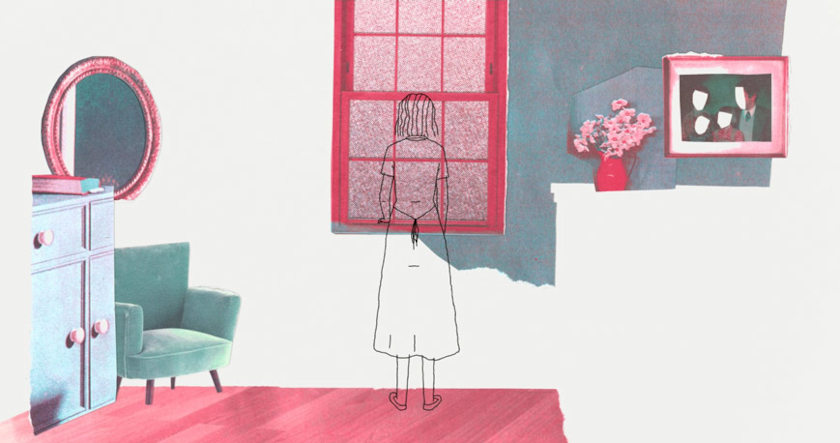
A woman looks back at her years of marriage and recounts her daily life of physical and psychological abuse. Locked away in her house, she drowns in her guilt, until the day she decides that it has to stop.
More one complex topic to address is domestic violence. 'Cold Soup' uses cartoons and cutouts to condense the character's drama into images despite not showing explicit violence. The option to represent the characters only through black lines on a bi-chromatic background worked very well.
Maurice’s Bar - Tzor Edery-Mordekovich, Tom Prezman (France)
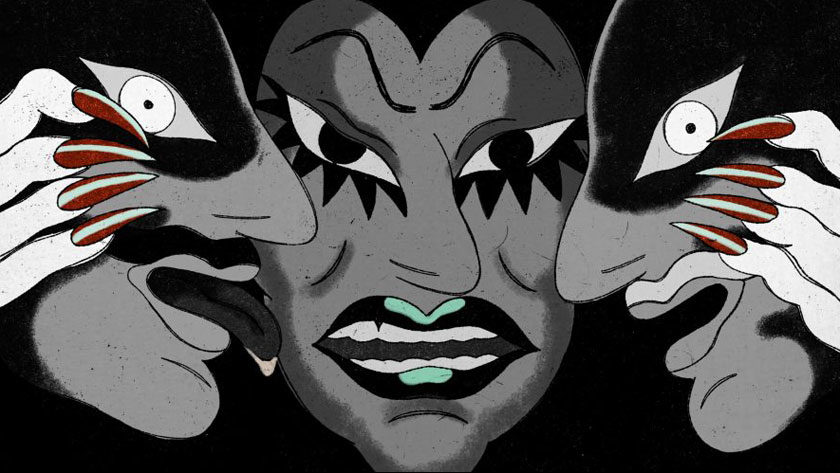
In 1942, on a train to nowhere, a former drag queen remembers a night from her past in one of Paris’ first queer bars. Remnants of customer gossip recall this mythic bar and its mysterious Jewish-Algerian owner.
A Colorful Cartoon, Maurice’s Bar is an animated doc with some graphic, darker moments. The way it presents the story and tells facts from the life of drag queen life at the beginning of the 20th century. I wanted to see more.
Island - Michael Faust (Israel)
Island recounts the history of a small secluded island over the course of several millennia, to reveal a telling lesson about human nature.
It was simply brilliant how, in 7 minutes, the director managed to synthesize how human beings function like a plague on the planet. Through a typical comic book drawing, Michael showed the extraction of resources from a place until extinction, the peak and the total fall of a location, and at the same time, with a subtle but acidic humor. Very intelligent. It was awarded the Best Short Film Up to 8 Minutes Alves-Costa Award.
Our Uniform - Yegane Moghaddam (Iran)
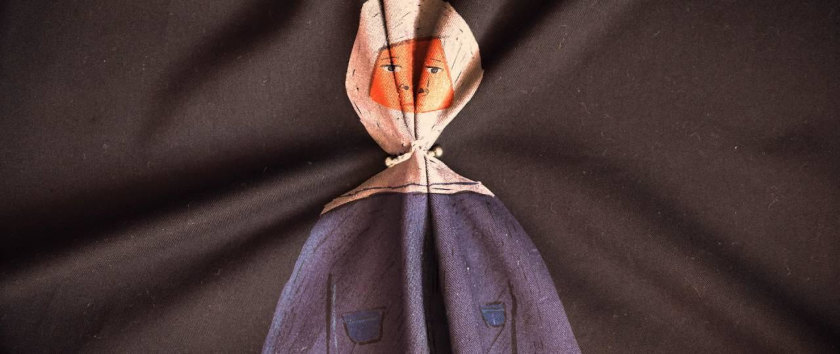
An Iranian girl unfolds her school memories through the wrinkles and fabrics of her old uniform. She admits that she’s nothing but a “female” and explores the roots of this idea in her school years.
The short was the grand champion of the night, receiving the main prize that allowed it to compete for an Oscar. It was another woman's film about women's issues. I found it very creative and coherent how Yegane used clothes as a basis for her animation. It is colorful lively, has a perfect team, and talks about restrictions and freedom. This short is an excellent example of the quality of Iranian animation development.
The Time Keeping House - Joana Imaginário (Portugal)
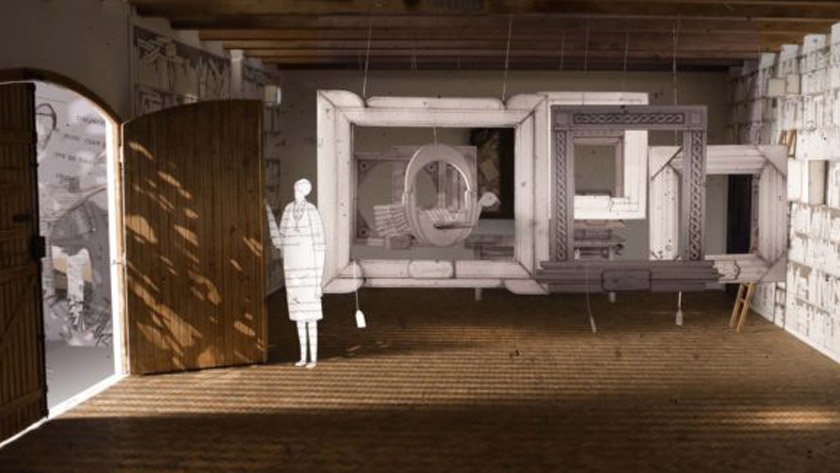
In a house where a library, museum, and workshops are mixed, the restorer goes through closed and secret rooms and creates the book that will save all the others.
I have already commented on this animation film before, but it always impresses me. Made in stop motion on paper, with sets and paper puppets, it shows me different things every time I see it. It is very visually rich, despite the little color used: the light tones of the paper, beiges, and textures. The relationship of time, the conflict between the male and female characters, and the role itself, the basis of the entire animated film, is very intriguing and poetic.
Skinned - Joachim Hérissé (France)
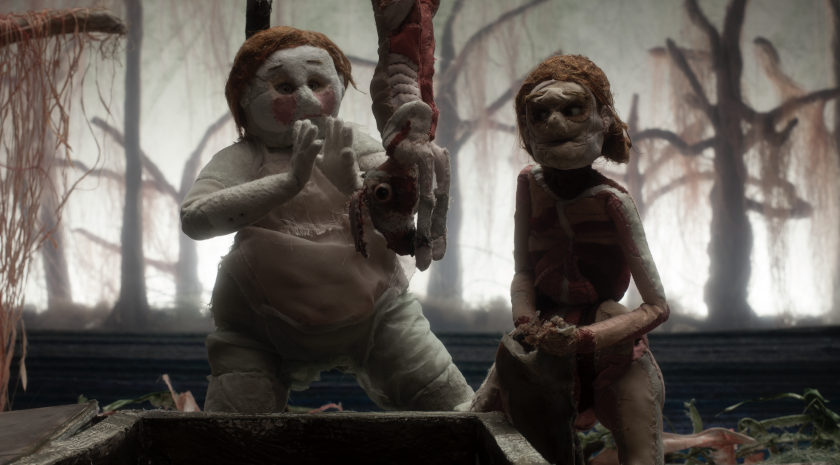
In an old building, lost in the middle of the swamp, live two strange women, Siamese twins by one leg. At night, the Flayed has terrifying nightmares in which she sees her sister’s flesh covering her own body…
I have seen it before, but the tension and tragedy of its scenes is still ongoing. 'Skinned' was made in stop motion, with fabric puppets, which are inexorably linked. Again, it is another animation that tells us about toxic relationships and how they can kill or make us die. Those situations and feelings are presented in a way only stop motion can offer us. Magnificent.
Four Souls of Coyote - Áron Gauder (Hungary)- feature film
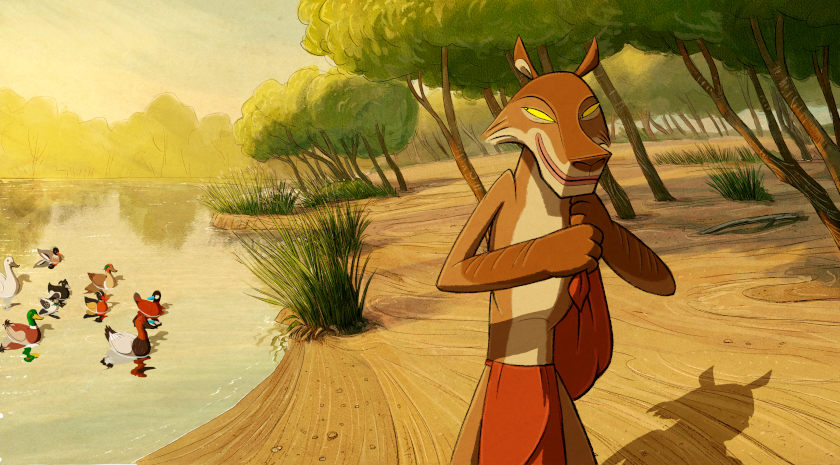
Native American protesters confront an oil pipeline project, down the hill from their ancestral land. The grandfather evokes the tale of Creation, reminding all of us that we need to find our place in the great circle of creatures.
A film that won the Jury Prize at the 2023 Annecy Festival and also the winner of the Grand Prize Cinanima 2023 feature film, was indeed the best film in its category. Made with a cartoon aesthetic, it mixes myths and real and tribal stories to discuss respect for nature. The most significant merit lies in the script, which mixes all this information and still synthesizes distant chronological facts that make sense in the narrative.
To conclude, I want to note some trivia in these sessions I have watched: the presence of dogs in all the feature films (a coyote is a kind of dog); explicit or implicit violence in four of five Israeli short films; 10 shorts were about mother-child or ancestrality relationships (17% of the shorts), and the feature film 'A Greyhound of a Girl' (Enzo d’Alo, 2023) presents a nightmare scene animated by Regina Pessoa.
From this Cinanima report, I hope Zippy Frames readers can participate a little in this amazing festival and note how the art (and cannot be otherwise) has the power to translate and mirror the moment we live.
| Related: Cinanima 2023 Winners |
contributed by: Eliane Gordeeff




